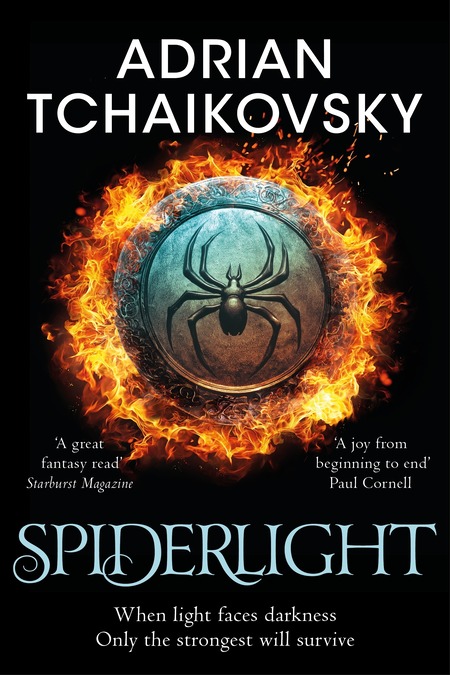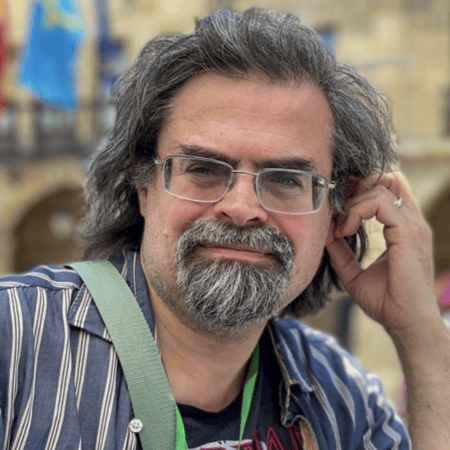(courtesy Pan Macmillan Australia)
The grand and noble quest across vast distance in pursuit of the decisive victory of good over evil is a staple of fantasy novels.
It crops up again and again and for very good reason – here is the perfect vehicle for putting disparate people together, characters who would not ordinarily be in the same place at the same time, much less united, or somewhat in pursuit of the same goal and who are tested in ways they never imagined while an epic narrative plays out around them.
There’s so much you can do with that so its understandable that so many writers employ it; but like many a much-loved trope, it gets overdone and can lose its power unless you are smart and imaginative enough to do something truly original with the idea.
Which is precisely what Adrian Tchaikovsky is and his novel Spiderlight demonstrates what you can do when you look at some well-worn storytelling bones and ask yourself what can I do to not just give the trope a dust off and a fetching look of narrative paint, but blow the tried-and-true approaches well and truly out of the water.
Spiderlight is a marvellous example of how you can take a mainstay of the “nothing new under the sun” camp, and let’s be honest that’s just about every element of storytelling at this stage of human history, and do something so astoundingly smart and clever than the story stays with you for days afterwards.
The four of them trailed up the hill, Dion letting the Light of Armes subside until it was only a soft glow.
Something was crouched atop the hill, something that seemed like a man. It lifted its head.
In fact, as this review is written, a number of key scenes are playing out in this reviewer’s mind, the finely etched and powerfully compelling moments when adventure is not embarked upon but people of all kinds of stripes have to find a way to not make it just work but to emphatically deliver on its intent.
After all, freeing the land from tyranny is a huge ask and an unavoidable goal, and mere bickering and dissension cannot be allowed to stop those on a holy quest from being successful.
While many have failed in the past to unseat Dark Lord Darvezian, Dion of the church of Armes the Light believes time and prophecy is on their side, and while they struggle with their faith, more than they’d like to admit, they gather warriors and thieves and one truly unusual being, a sentient spider turned grotesque man who comes courtesy of a mage’s magic, together, confident they will be the one to do what has not previously been done.
It’s a potent mix of pure religious belief, tinged with trenchant doubt, and pigheaded tenacity and it powers the events of Spiderlight which is so far from your ordinary quest fantasy that you will find yourself gasping in joy and amazement at just how brilliantly Tchaikovsky takes the form and subverts and bolsters to unexpected new heights all at once.
This impressive novel, which does not pause for breath for a second and yet which feels perfectly weighted between action and emotional intimacy, with vibrantly expressed humour thrown in for good measure, takes all your expectations and upends to gloriously unforgettable effect.
Part of that, and a significant part of why Spiderlight works so damn well, are the characters at the heart of the story.
Dion is the leader and when faith starts to falter, they try bluff and doubt-crushing self-talk to keep themselves on the right path while Penthos, a mage who has magic but doled in uncertain and unpredictable ways, Lief a thief who may have a heart of altruism after all, warrior Harathes who’s a bit of unreconstructed soul who knows only one setting and it’s not peaceful interaction, and the archer Cyrene who is trying to atone for guilt-ridden past misdeeds.
They are joined, and not willing but good lord the prophecy demands it, by a spider-man named Nth aka Enth, who is summoned from his original arachnid form by magic and unwillingly leads the way to Lord Darvezian’s home using ancient knowledge from his spidery Mother.
It’s an unholy group of people on a supposedly holy quest and while such a grave task should focus minds, still hearts to one purpose and bring about a unity of thought and action, what happens is that everyone squabbles and fights, and while they do not draw nearer to each other, it’s not quite as loftily as standard fantasy demands.
And that, dear readers, is why this novel is such a dynamically clever, fun read because Tchaikovsky happily subverts the standard, usual thing while still telling an enthrallingly good story that is epic and intimately human all at once (even if you’re a magicked spider none too happy about being made human).
‘Go on friend. Be free,’ he encouraged.
Enth’s soulless black eyes found Cyrene.
He reached out and grasped the hilt, levering the blade out, staring at her.
The other magically brilliant part of Spiderlight is Tchaikovsky goes completely gloriously meta in the final act.
As you approach the end of the novel, it’s best to discard any and all notions of how you think the book will end; saying exactly how it does end would be to venture into massively big spoiler territory to too great an extent, but suffice to say, the author has an absolute ball subverting tropes, cliches and expectations.
So imaginatively and cleverly does he do this that you will spend the last part of the book in raptures, thrilled that the Lord of the Rings ending you think might be able to happen simply doesn’t.
But this is no mere halfhearted subverting of expectations; Tchaikovsky goes all out, and has a ball with it, filling the scenes with witty dialogue, characters who have to confront the fact that all the cosy orthodoxies they have held onto may not even be remotely right and a general sense that here is a writer who doesn’t just want to subvert the usual great quest storytelling tropes but bust them wide open and see what wanders out.
Spiderlight is an absolute delight – full of heartfelt humanity, lots of hilarity, serious questing and a general sense that while you might you know how the world operates and thus how certain things might play out, that you know nothing and while confronting at first, that might be not such a bad thing after all, once the narrative dust settles, of course.

